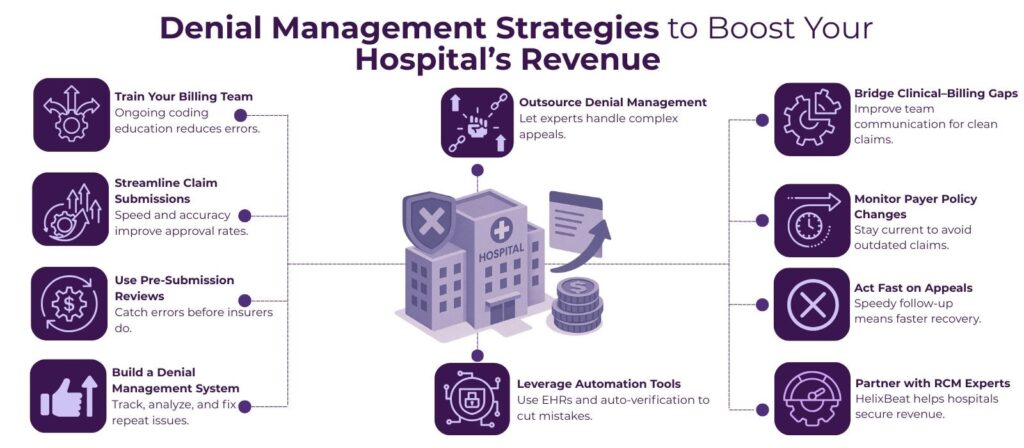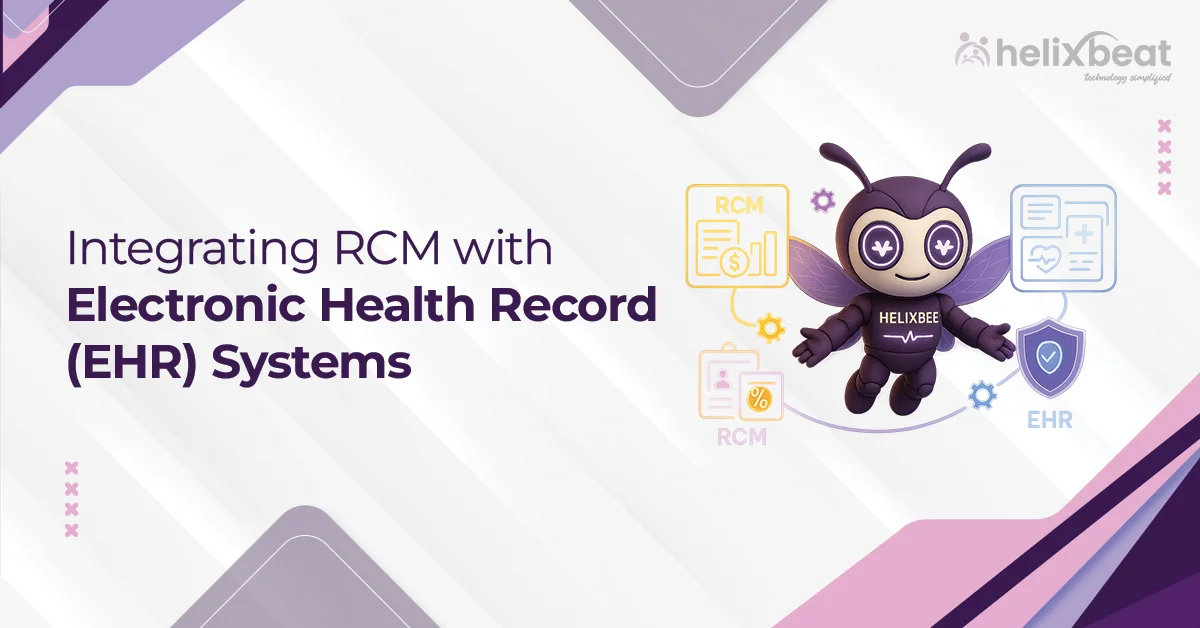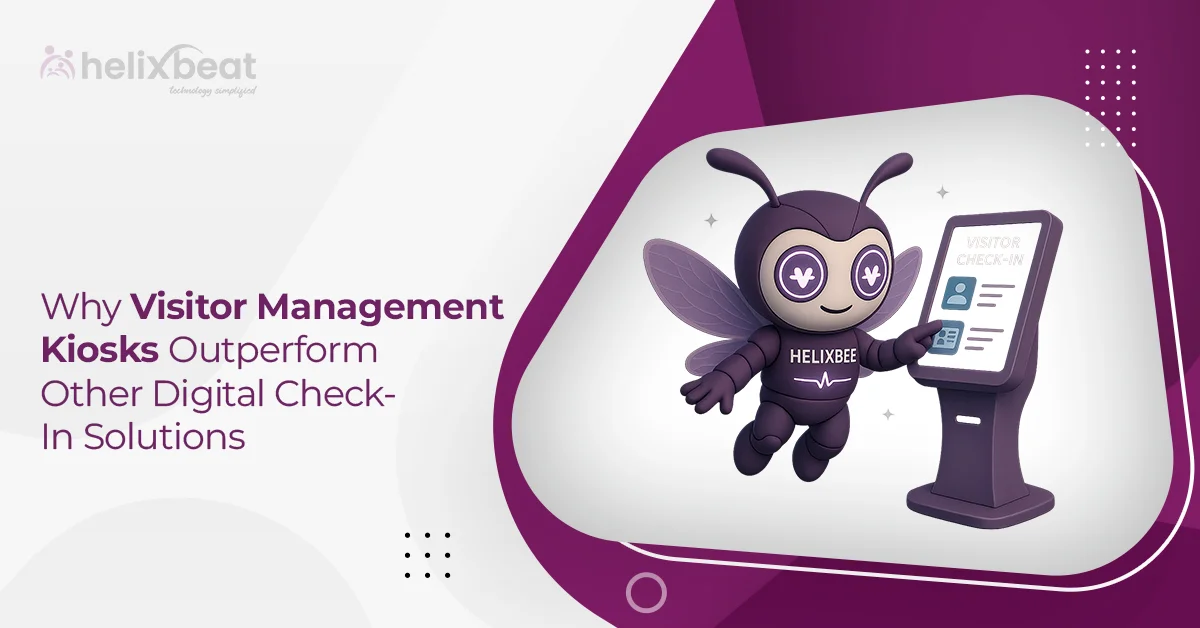Denial management has become one of the most pressing challenges in healthcare revenue cycle management. As hospitals process thousands of claims each day, even small coding or documentation errors can result in costly delays. In fact, the American Hospital Association reports that nearly 1 in 10 medical claims are initially denied, contributing to billions in lost revenue across the industry.
For healthcare providers already operating under financial strain, these denials can severely disrupt cash flow. That’s where HelixBeat revenue management cycle healthcare services provide a vital solution—equipping hospitals with technology and expertise to streamline claims processing, reduce denials, and safeguard their financial performance.

Table of Contents
Challenges of Denial Management in Healthcare
Denial management is a crucial part of revenue cycle management , yet it comes with a number of challenges that healthcare organizations must navigate. Below are the key challenges that hospitals face when managing claim denials:
1. Complexity of Billing and Coding
One of the primary challenges in denial management is the complexity of healthcare billing and coding. With the frequent updates to coding systems, insurance regulations, and medical documentation requirements, even a minor mistake can lead to a denied claim. Hospitals must ensure that their billing teams stay current with all these changes, which can be both time-consuming and costly. Improper coding or missed documentation can significantly delay reimbursement, negatively affecting the hospital’s cash flow.
2. High Volume of Denied Claims
Healthcare providers often deal with a high volume of claims each day. With so many claims being submitted, it can be difficult to track and resolve all denied claims in a timely manner. A large number of denied claims can result in cash flow disruptions, as payments are delayed or reduced. Hospitals need to have efficient revenue cycle management healthcare systems in place to monitor and address these denials, which can overwhelm already stretched billing teams.
3. Time-Consuming Appeal Processes
When a claim is denied, healthcare organizations must go through an appeal process to recover revenue. This process can be extremely time-consuming, requiring detailed documentation, follow-up communications with insurers, and sometimes multiple rounds of appeal submissions. The time it takes to resolve a denied claim directly impacts revenue cycles and can further delay payment recovery. Efficient denial management requires a streamlined process to handle appeals quickly and effectively.
4. Lack of Staff Training
One of the key reasons for denial is insufficient staff training. Billing and coding personnel need to be continuously educated about the latest medical codes, insurance policies, and compliance regulations. If healthcare staff lacks the necessary skills and knowledge, they may unknowingly submit incorrect claims, which increases the likelihood of denials. Regular training programs are essential to reduce errors and improve the accuracy of claims submissions.
5. Communication Gaps Between Clinical and Billing Teams
Another challenge is the communication gap between the clinical and billing teams. The clinical team may not always provide sufficient or accurate information to the billing department, leading to mistakes in claim submissions. Accurate and complete documentation of patient care is essential for proper billing. Hospitals need to improve collaboration between clinical staff and billing teams to ensure that all necessary information is included in claims and that any issues are caught early.
6. Changing Payer Policies
Insurance providers frequently change their coverage policies and requirements, which can affect claim approvals. Healthcare organizations must stay updated on these changes to avoid denied claims due to policy discrepancies. Inconsistent payer policies and the frequent updates to reimbursement rules make it difficult for hospitals to stay on top of all the requirements, leading to an increased risk of denials.
Top 5 Denial Management Strategies
1. Invest in Staff Training and Education
One of the most effective ways to mitigate denials is to invest in your hospital’s billing and coding staff. These team members are the frontline defense against claim denials, and their ability to navigate the complex healthcare billing landscape accurately is crucial. Continuous education and training programs must be a priority to reduce the likelihood of denials and enhance the hospital’s financial health.
Healthcare regulations and coding systems, such as ICD-10-CM and CPT codes, are constantly evolving. A minor error in documentation or coding can lead to claim denials, which delay reimbursements and affect the hospital’s cash flow. Regular training sessions should focus on:
- The latest coding standards (e.g., ICD-10, CPT)
- Changes in healthcare billing guidelines and compliance requirements
- Understanding various insurance plans and their specific regulations
- Proper medical terminology and documentation practices
Revenue cycle management (RCM) healthcare solutions often offer training tools that can help hospitals stay up-to-date with the latest coding and billing standards. When hospitals invest in ongoing training, they reduce the chances of errors and denials, ultimately ensuring smoother claim submissions and better reimbursement.
2. Streamline the Claims Submission Process
Submitting claims accurately and promptly is one of the most crucial steps in the revenue cycle management process in healthcare. A streamlined claims submission process helps reduce errors, increases the chances of approval, and ultimately shortens the reimbursement cycle. Hospitals must prioritize creating a clear and efficient revenue cycle management healthcare system for submitting claims, particularly in an environment where both patient volume and claim complexity are constantly rising.
Several key actions can enhance the claims submission process:
- Use of Electronic Health Records (EHR): Leveraging EHR systems can ensure patient data is accurately transferred to claim forms, reducing the risk of errors and omissions.
- Automated Eligibility Verification: Before submitting claims, verify the patient’s insurance coverage electronically. This can help avoid processing claims for patients with expired or insufficient coverage, preventing denials from the outset.
- Batch Claim Submissions: Hospitals should invest in software that allows for batch claim submissions. This not only saves time but also ensures consistency across claims, reducing the likelihood of errors.
By optimizing the claims submission process, hospitals can address one of the most common causes of claim denials and improve their revenue cycle management healthcare approach. With a faster, more efficient claims submission process, hospitals can enhance cash flow and reduce the burden of rejected claims.
3. Conduct Regular Pre-Submission Reviews
A proactive approach to claims management can help hospitals identify and resolve issues before claims are even submitted to insurance companies. By conducting regular pre-submission reviews, hospitals can ensure that all claims are accurate and complete before submitting them to insurers, thereby significantly reducing the risk of denials.
Pre-submission reviews should involve a thorough review of each claim to ensure:
- Patient demographics and insurance information are accurate and up-to-date
- Documentation is complete and matches the services provided
- The correct codes are used to reflect the treatment given
- There are no discrepancies between medical records and claim forms
By catching errors early, hospitals can reduce rework, streamline the revenue cycle management healthcare process, and boost their revenue by improving the rate of first-pass claim approvals. Healthcare facilities that integrate automated pre-submission review systems into their revenue cycle management solutions can more efficiently check claims for common errors, allowing for faster corrections and submission.
4. Develop a Robust Denial Management System
Denials are inevitable in the healthcare industry, but having a robust denial management system (DMS) in place can significantly improve a hospital’s ability to address and resolve these issues. A well-organized system enables hospitals to monitor denied claims, identify trends, and implement targeted strategies to address recurring issues.
Key components of an effective DMS include:
- Categorizing Denials: Track denials by their cause (e.g., coding errors, lack of documentation, patient eligibility issues). Categorizing denials helps hospitals identify the root causes and address them systematically.
- Trend Analysis: Use denial management software to analyze trends and identify patterns in the denials. This data can highlight areas of weakness in the billing and coding processes and guide improvements.
- Appeal Process Management: A good DMS should include tools to support the appeals process. This allows hospitals to compile necessary documentation and submit appeals efficiently, increasing the chances of reversing denials.
HelixBeat’s revenue cycle management healthcare solutions offer advanced tools to categorize denials, track trends, and streamline the appeals process, making it easier for hospitals to recover lost revenue. By developing a comprehensive DMS, hospitals can tackle denial trends head-on, reduce their frequency, and ultimately improve their bottom line.
5. Consider Outsourcing Denial Management
For hospitals with limited staff or resources, outsourcing denial management to specialized healthcare revenue cycle management healthcare companies like Helixbeat can be a game-changer. Outsourcing helps alleviate the burden of managing denials in-house and ensures that experts handle the process, improving the likelihood of successful appeals and faster revenue recovery.
Revenue cycle management healthcare solutions providers bring a wealth of experience and advanced technology to the table. By outsourcing denial management, hospitals can:
- Benefit from dedicated professionals who specialize in navigating the complexities of denials
- Leverage advanced technology and best practices for efficient denial management
- Focus internal resources on other essential areas of hospital operations
Outsourcing denial management to a trusted revenue cycle management healthcare company, such as HelixBeat, can help hospitals improve their claim approval rates, optimize their revenue cycle, and ultimately boost their financial health.
Final words
Claim denials can silently erode a hospital’s financial health if not managed with care and strategy. They lead to delays, lost revenue, and added pressure on already burdened administrative teams. However, with a focused approach to denial management, healthcare providers can shift from reactive fixes to proactive prevention.
HelixBeat’s revenue cycle management solutions empower hospitals to identify issues early, streamline processes, and build collaboration between clinical and billing teams. With the right support, denial management becomes less of a challenge and more of an opportunity to strengthen operations and deliver better patient care with financial stability at its core.
Get in touch with helixbeat Revenue Cycle Management solutions today. Free up internal resources.
FAQs
What is denial management in healthcare revenue cycle management?
Denial management is the process of identifying, analyzing, and resolving denied insurance claims to recover lost revenue and optimize financial performance.
Why do hospitals face so many claim denials?
Hospitals often deal with claim denials due to coding errors, incomplete documentation, policy changes, and lack of coordination between clinical and billing teams.
How can staff training help reduce claim denials?
Proper training ensures billing staff stay updated on codes and compliance regulations, reducing submission errors and improving first-pass claim approval rates.
What tools can improve revenue cycle management healthcare efficiency?
Electronic Health Records (EHR), denial management software, automated eligibility checks, and pre-submission review tools streamline processes and reduce errors.
Is outsourcing denial management effective for hospitals?
Yes, outsourcing to experts like HelixBeat allows hospitals to leverage specialized knowledge and technology for quicker appeals and higher claim recovery rates.
How does communication between departments impact claim approvals?
Poor communication between clinical and billing teams can result in incomplete claims. Improved collaboration ensures accurate documentation and reduces denials.
What are the benefits of using a denial management system (DMS)?
A DMS categorizes denial reasons, tracks trends, automates appeals, and helps hospitals proactively address issues to maintain consistent revenue flow.














